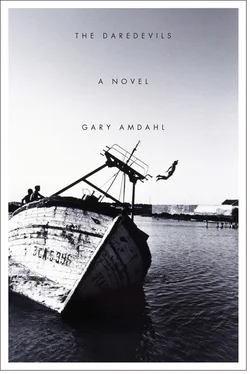“Yes,” he said, barely audible from the balcony. “Do carry on.”
“Which is to say, everything lies static and helpless in the brain until we can figure out how best to present our show to everything that we perceive to be outside our brains. Our audience.”
Vera began to clap, but nobody picked it up, and she stopped.
Three days later, Charles arrived at the motorcycle shop, devoted still to the idea of taking her to Sutro Baths, to, generally speaking, picking up where they’d left off with the appearance of Warren Farnsworth.
“You said something about a bad year?” asked Charles.
They were standing on the sidewalk, waiting for a jitney driven by a friend of Vera’s.
“Yes,” she said. “Last year.”
“What was it,” Charles asked, “if you don’t mind my asking, made last year so bad?”
“The free press became markedly less free.”
“Did it indeed?”
“Indeed it did!”
“Beg your pardon if that sounded—”
“Not at all.”
“—ironic. Life is ironic and I make it a principle to be simple and straightforward whenever possible to maintain a clear and useful distinction.”
“Not at all, not at all! Clearly and usefully distinct!”
“Even more simply and straightforwardly I must admit I hadn’t noticed—”
“No, of course not, you were looking at the surface of the newspaper. The repression was— is —being worked below the surface.”
“Of course. I have no difficulty believing you. That is in fact why I am apologizing: that I should have been caught out staring at the surface. Me! It’s absurd. I feel like an—”
“Well, you mustn’t!”
“Very well. Thank you. Now please allow me to ask you how you yourself were able to see below the surface.?”
“I defended the press in the basement. I gave over a good deal of myself to it, in a fanatical, Russian-style defense of the secrecy of the location of this press. For the sake of its freedom. A great deal. And I lost that great deal. I wasted it. Only three people knew the press was here, and because I was its minder, its drone, because I volunteered, I felt very deeply responsible for it, and I stayed there, in that room, for a year. I’m not kidding. A year. Never went out. They brought my meals into me, and yes, some books. What was I so afraid of? In the land of the free and the home of the brave? Isn’t the freedom of the press secured in the Constitution? Who cared that we were printing what we were printing? You may ask all those things and be only reasonable. Maybe my fear was unreasonable! But let me tell you, this was a question — the location, the existence, of a certain kind of press, an uncontrolled press, one that was in truth free —that had already had, believe it or not, grave consequences attending its answer! Your father will never see a speck of evidence to back up my claim, but let me assure you, Mr. American, it is true .”
Vera stopped, removed her glasses, and cleaned them. Holding them in her hand, she resumed her speech in a quieter voice. “Then I had a little bit of a collapse, my consciousness collapsed into a pool of tears, and you know, they got me out of here, took me to Sutro Baths and so on, but I didn’t like being outside. I felt I was transparent. Almost.”
Wildly in love with her, thinking just that, Charles said nothing.
“There’s no way that can make sense. You give your life over to spreading the news, you know, letting people hear what’s really going on, but at the same time you are yourself some kind of terrible secret that must never get out. Like I say, I was already pretty Russian around the edges, and I was reading Nechayev’s Revolutionary Catechism. You know what I mean, I think. ”
She looked up and mistook Charles’s expression of overwhelming desire for evidence that he did not in fact know what she meant, that he was disdainful almost to the point of anger.
And yet she drew much closer.
“The revolutionary can have no love, no friendship, no joy, no life, no self. All is required by the revolution. Everything is sacrificed for the sake of others. You starve for the starving, suffer oppression for the oppressed, terrorize for the terrorized, murder and destroy for the murdered and destroyed. But now I don’t give a shit. I mean that in a positive way. The press is beautiful. It’s just like William Morris’s and he was a beautiful man: fine, okay, good. But its days are numbered. They’re going to get it sooner or later and they’re going to smash it to pieces, so why make myself crazy watching over it, like some daffy shepherdess. I’ll use it while I can. When they take it, I’ll use something else. See? I’m all better!”
Better or not, she appeared to have exhausted herself, for she sat down on a bench in front of one of the shop windows, this one displaying the painted symbol of the Flying Merkel brand, and held her head in her hands.
As they drove across the dunes of the Western Addition, Charles recounted his days as a competitive swimmer. “With my long arms and legs and broad shoulders, I was a natural swimmer and as helplessly gifted physically as I was mentally and socially. I quickly became captain of the team. Then a gentleman from Hawaii arrived on the scene. He was an ambassador of an ancient Polynesian pastime called “wave sliding,” and was reputed to be an excellent swimmer as well. An exhibition race was arranged between the Sutro Baths Club and the Hawaiian, and while everyone understood that the Hawaiian was possibly the best swimmer in the world, it was also widely believed that old Charlie Minot could upset him, given the home water and proper circumstances. Some would have inserted weights in the Hawaiian’s trunks but couldn’t figure out how to do it without being noticed. In fact, we were neck and neck for the first fifty yards, the Wave Slider and the Boy Wonder. Quite a large crowd was in the grandstand, and they made quite a lot of noise in that echo chamber until the turn, when the Hawaiian pulled away as if he’d had a Swedish outboard motor attached to his feet. He finished the second fifty so swiftly he seemed to have been pretending during the first. That, Vera my dear, was in fact how I saw it, and I was humiliated.”
Vera laughed at the idea of such trivial humiliation.
They arrived and walked into the large entrance hall. A photograph of the competitors was framed and hung in the gallery that marked a diversion to the Sutro Baths’ Museum of California. The photograph was signed by the Hawaiian, who went on to win a gold medal at the Olympics in Stockholm and become the sheriff of Hawaii, and everyone is smiling good-naturedly in his dark and charismatic presence—“Save me,” said Charles as he and Vera stood leaning toward it in serious examination, “over whom you surely see a cloud of truth passing. I was not only imperfect, I was cold. The women were all over the Hawaiian. Oh, I suppose they were in some sense all over me as well, given that I was wealthy and good-looking, and this was 1913 when all was well in our once-more-fair city — but a powerful force repelled them. I found them daffy, trivial. When pressured to treat some matter or thought with serious attention they became mean or defiantly stupid. Of course I was afraid I was taking my own — my own what, deficiencies of spirit? — out on them, didn’t want them to feel repelled, and eyed them all as if I were simply a particularly choosy Don Juan. But something else, much deeper, much stranger, was wrong with me. I thought, yes, there is one reality that is immutable, and that is where my spirit resides, but there is another reality, one that changes constantly and which can be, which ought to be, somehow, enjoyed. But I could not.”
Читать дальше












